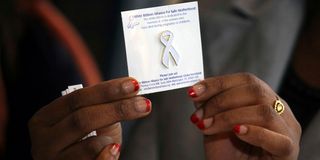Entrench safe motherhood

To uphold the fundamental human right to health, as enshrined in the Constitution, maternal health must remain a top government priority.
In 2020, nearly 800 women died daily from pregnancy- and childbirth-related preventable causes, a maternal death every two minutes. While the global maternal mortality ratio (MMR) dropped by 34 per cent from 2000 figures, that 95 per cent of cases were in low- and lower-middle-income countries is a concern. Kenya had a high MMR, of 530 deaths per 100,000 live births, above the global average of 223, thus the urgent need for action.
Maternal mortality mostly stems from preventable causes like haemorrhage, sepsis, obstructed or prolonged labour and unsafe abortion. Maternal morbidity, short- or long-term health complications arising from pregnancy and childbirth, can be fatal.
Maternal mortality and morbidity problem is not just a public health issue but also human rights concern. These tragic occurrences infringe upon fundamental human rights such as the right to life, the highest attainable standard of health, education, information, equality and non-discrimination.
As part of universal health coverage (UHC), the government developed a nationwide programme, Linda Mama, to provide free antenatal, neonatal and postnatal services to reduce maternal morbidity and mortality. That has led to increased antenatal and postnatal care attendance, greater adoption of family planning, higher immunisation rates and decline in home deliveries. But it faces challenges.
One major issue is the inadequate, delayed and inconsistent government reimbursements restricting health facilities from providing free maternal healthcare services. Women incur out-of-pocket expenses, thus a heavy financial burden on low-income households. Another is lack of proper equipment and resources in health facilities.
Globally, states have committed to reducing the maternal mortality ratio to less than 70 per 100,000 live births by 2030, as per Sustainable Development Goal 3. To uphold the fundamental human right to health, as enshrined in the Constitution, maternal health must remain a top government priority.
Ms Nuna is a sexual and reproductive health and rights youth advocate at Naya Kenya. [email protected].





